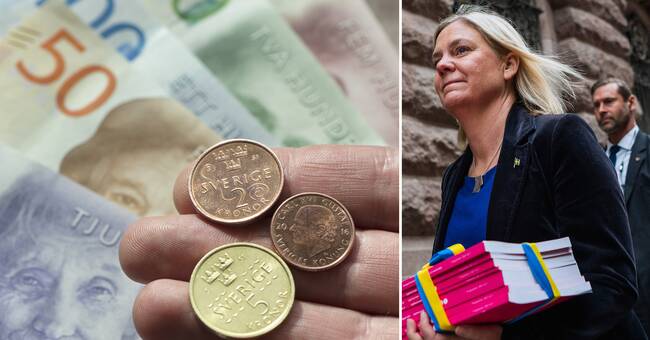The money is raining down on households in our elongated country, especially on ordinary people who need them extra.
That's what we're all hearing about the government's budget.
But from your and my perspective, it will be the opposite - more for high-wage earners and less for those with low wages.
Time and time again, it is pumped out: the phrase "tax cuts for low- and middle-income earners".
And not just from the government.
The message has been launched so successfully that newspapers and TV happily carried it on, as soon as the budget came up.
Of course, this is about the large tax cut with which the government launched this autumn's annual publicity campaign, also known as the "autumn budget".
7.5 million Swedes will receive lower tax next year.
It is, for most, about 110 kronor a month.
The cleaner gets as much as the CEO
And of course, 85 percent of the seven billion the government spends on this tax cut goes to people who do not pay state income tax, ie earn a maximum of about 45,000 kronor a month.
But you get the same amount of kronor no matter how highly paid you are.
As much to the cleaner as to the listed company CEO if you will.
Compare with the child allowance: it is usually not described as a allowance for low- and middle-income earners.
But as a contribution that is equal for everyone.
On the contrary, when it comes to tax cuts, it will be smaller for those who work for the lowest wage.
The tax reduction is gradually being phased in and you must earn at least SEK 265,000 a year to get the maximum reduction of SEK 110 a month.
Among those who do not work, but live on sickness benefit, sickness benefit or pension, many receive significantly more in the budget.
The ceiling for sickness benefit is raised, those who have sickness or activity compensation receive a tax reduction of SEK 800 per month, and pensioners receive an increased housing supplement.
According to the government's own example, it will be SEK 500 more per month for both the guarantee pensioner and the pensioner with a full pension supplement.
At the same time, this means that those who get the least out of the tax reduction in the budget are those who work but do not reach SEK 265,000 a year.
SEK 265,000 corresponds to the lowest collectively agreed salary for full-time work.
Those who work part-time can thus earn less and thus receive a smaller tax reduction.
And in fact, high-income earners not only get as much as full-time low-income earners, but much more.
When SVT asked Swedbank to calculate in detail the wallet effects, it turned out that employment tax deductions and basic deductions mean that a person who earns SEK 60,000 a month receives SEK 470 more a month in the government budget.
Anyone who earns SEK 34,000 must be content with SEK 160.
May be minus in the wallet next year
Unemployed and students receive SEK 130 and SEK 161 respectively.
Families with children are attracted to more days off with their children, but the wallet effect of the government's large tax cut will be only SEK 180 a month in Swedbank's calculation example.
The small amounts mean that in reality it could just as easily be minus next year - inflation has risen.
If it does not go down, interest rates and thus housing costs can rise.
Not to mention how rising interest rates in turn would affect the stock market where many have their savings.
The tax cuts may still make more people buy latte more often.
But they are not enough to seriously improve the country's economy - but then it is important that there are people who can take jobs in the increasing number of industries that are screaming for people now that the economy is picking up speed, and that there are jobs for the record 190,000 who at the same time are long-term unemployed.
Here, the government is investing eight billion and keeping its fingers crossed.

